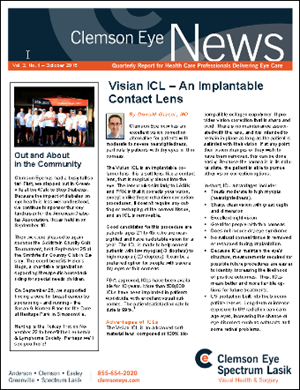Posted by: Clemson Eye in News

By Dr. Donald Glaser
Clemson Eye News, October 2015
Clemson Eye now has an excellent vision correction alternative for patients with moderate to severe nearsightedness, particularly patients with dry eyes or thin corneas.
The Visian ICL is an implantable collamer lens. It is a soft lens, like a contact lens, that is surgically placed into the eye. The lens works similarly to LASIK and PRK in that it corrects your vision, except unlike these refraction correction procedures, it doesn’t require any cutting or reshaping of the corneal tissue, and an ICL is removable.
Good candidates for this procedure are patients ages 21 to 45, who are nearsighted and have had stable vision for a year. The ICL is made to help correct patients with low myopia (-3 diopters) to high myopia (-20 diopters). It can be a preferred option for people with severe dry eyes or thin corneas.
FDA-approved, ICLs have been available for 10 years. More than 500,000 ICLs have been implanted in patients worldwide, with excellent visual outcomes. The patient satisfaction rate to date is 99%.1Advantages of ICLs
The Visian ICL is an advanced soft-material lens, composed of 100% biocompatible collagen copolymer. It provides vision correction that is sharp and vivid. There is no maintenance associated with the lens, and it is intended to remain in place as long as the patient is satisfied with their vision. If at any point their vision changes or they wish to have them removed, this can be done easily. Because the cornea is in its natural state, the patient is able to pursue other vision correction options.
In short, ICL advantages include:
• Treats moderate to high myopia (nearsightedness).
• Sharp, clear vision with great depth and dimension.
• Excellent night vision.
• Great for people with thin corneas.
• Does not induce dry eye syndrome.
• No natural corneal tissue is removed or reshaped during implantation.
• Because ICLs maintain the eye’s structure, measurements required for possible future procedures are easier to identify, increasing the likelihood of positive outcomes. Thus, ICLs mean better and more flexible options for future treatments.
• UV protection built into the biocompatible lenses. Long-term or intense exposure to UV radiation can damage eyes, increasing the chance of eye disorders such as cataracts and some retinal problems.

The ICL is positioned behind the iris, where it is invisible to the patient and observers.
How is the procedure done?
The ICL procedure is an outpatient procedure that generally takes about 15 minutes. Prior to the procedure, the patient receives topical anesthesia drops to minimize discomfort. Then the eye surgeon creates a very small opening
to insert the lens into the eye with an injector. Once the lens is injected, it unfolds in the eye and the procedure is complete. Patients typically experience minimal discomfort and return to work the next day.

Visian implantable collamer lens: It requires no maintenance and the patient can’t feel it.
What are the risks?
The risks of implantable contact lenses are similar to those of other refractive procedures like LASIK and PRK. However, ICLs do not have the complications associated with physically changing the shape of the eye. In addition, if any complications should occur, ICLs are removable. Complications related to ICLs include infection, increased intraocular pressure, and possibility of accidental damage to the crystalline lens during the procedure. In most cases, these complications can be corrected by the eye surgeon.
Who is not a candidate?
At Clemson Eye, we always recommend refractive patients have a vision consultation to determine their best vision correction plan. If ICLs are not a good option, we can consider other options.
Patients who have undergone any ophthalmic surgery or who have a history of eye disease such as iritis, glaucoma, or diabetic retinopathy are not considered good candidates for ICLs. In addition, ICLs may not be the best course of action for patients:
• Whose eye prescription has changed in the last year.
• Without a large enough anterior cell density.
• With an anterior chamber depth of less than 3.00mm.
• Who are pregnant or nursing.
• With uncontrolled dry eye or blepharitis.
• With corneal endothelial distrophy.
Through implantable contact lenses, we can offer patients with moderate to
severe myopia a high quality of vision and excellent, stable outcomes. We are proud to be the only eye surgeons in the Upstate currently offering this refractive procedure.
If you have questions about ICLs, or you have patients you think could benefit from this procedure, please contact our office for more information.
Click here to download Clemson Eye News, Vol. 2, No. 4 – October 2015 in PDF format.
Donald Glaser, MD, is a Clemson Eye ophthalmologist specializing in comprehensive medical and surgical eye care.
1. ICL in Treatment of Myopia (ITM) Study Group. United States Food and Drug Administration clinical trial of the Implantable Collamer Lens (ICL) for moderate to high myopia. Ophthalmology. 2004;111:1683-1692.